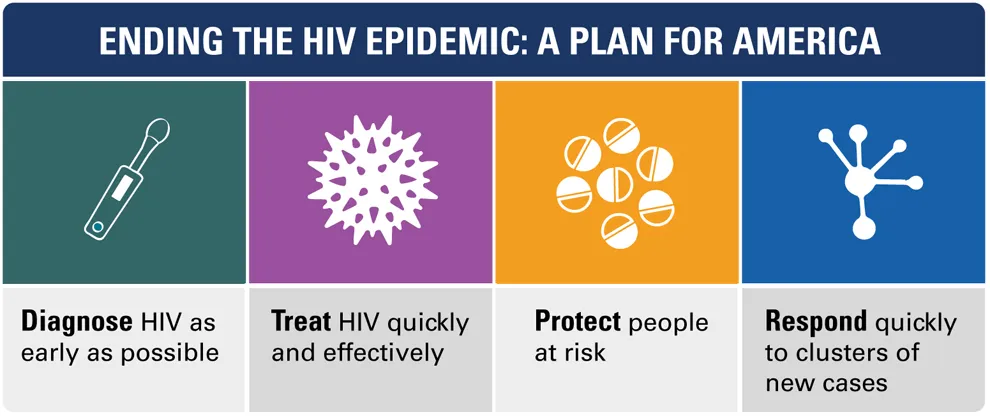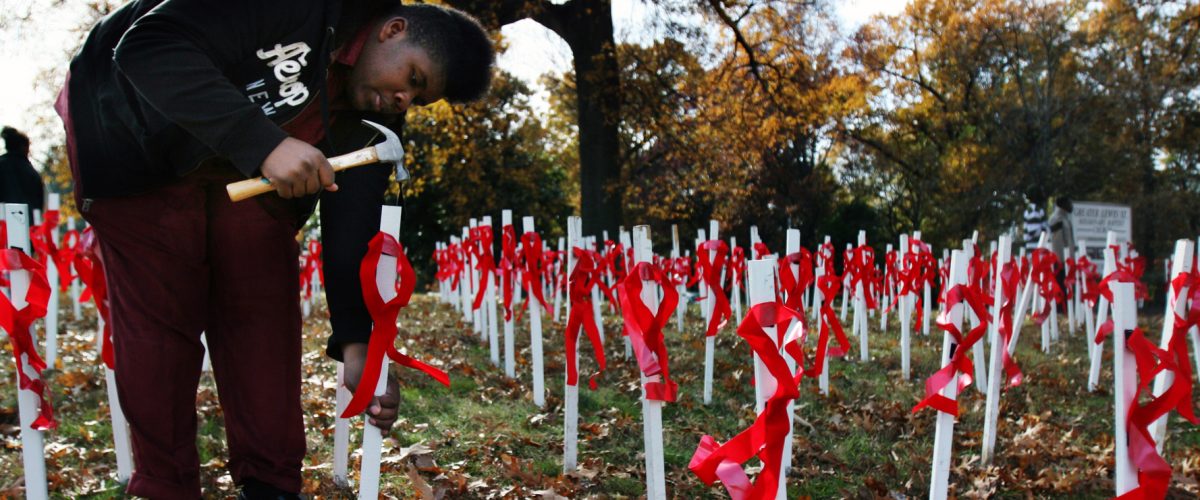June 27 is National HIV Testing Day, but beginning June 1, testing and treating HIV/AIDS in Tennessee will become more challenging for residents.
Gov. Bill Lee has rejected a multi-million-dollar federal grant from the U.S. Centers for Disease Control, a first for the state. For the past 15 years, the CDC’s Integrated HIV Surveillance and Prevention for Health Departments grant has been the primary source of funding for Tennessee’s HIV Prevention Services, including HIV testing, counseling and referrals, HIV partner counseling, HIV education, HIV prevention for positive individuals, public information about HIV, and a toll-free HIV/STD hotline.

Wayne Smith
“As I understand it, the CDC provides funds for HIV prevention to the Tennessee Department of Health. The Department of Health distributes funds through grant allocations to community-based organizations across the state,” explained Wayne Smith, director of Samaritan Ministry, a faith-based nonprofit providing support to people living with HIV. The Tennessee Department of Health also supplies free HIV test kits to testing partners like Samaritan Ministry in exchange for testing data to better monitor the HIV/AIDS epidemic.
Past bipartisan support of these programs and organizations has dramatically decreased the number of people diagnosed with HIV and increased life expectancy and quality of life for those living with HIV/AIDS in Tennessee and across the country. Now, Gov. Lee claims it is “in the best interest of Tennesseans for the state to assume financial and managerial responsibility for these services.”
However, Lee’s plan only includes the best interest of some Tennesseans.
A spurned population at risk
The CDC grant requires states to focus funding on those most at risk for contracting HIV, which, according to data from amfAR, are men who have sex with men, transgender persons, and intravenous drug users. In the state of Tennessee, these populations are also disproportionately young and Black.
The governor’s new “best interest” plan only provides testing and treatment for victims of human trafficking, first responders and mothers who could transmit HIV to their infants.
The governor’s new “best interest” plan only provides testing and treatment for victims of human trafficking, first responders and mothers who could transmit HIV to their infants. However, mother-to-child transmission is virtually non-existent in Tennessee, and first responders are not at risk anywhere in the U.S. Human trafficking, while tragic, does not significantly contribute to the total number of HIV cases.
These populations are a sympathetic smoke screen designed to obscure the political purpose behind Lee’s rejection of federal funding. “I do believe this is another example of a red state refusing to accept funds from the federal government in a way that can only punish Tennessee residents,” Smith said.
A leader in anti-trans legislation

Tennessee Gov. Bill Lee speaks during a Republican Governors Association conference on Nov. 15, 2022, in Orlando, Fla. (AP Photo/Phelan M. Ebenhack, File)
Since becoming governor, Lee and a conservative legislature have made the state a leader in anti-trans legislation, passing several bathroom bills, a law that prevents transgender teens form playing sports consistent with their gender identity, and a law requiring parents be notified 30 days in advance of students learning about sexual identity in school. The state is currently considering bills banning gender-affirming care for both minors and adults.
“My local state senator just announced over $100 million in new federal money for a small business loan program. He was very excited about this new opportunity for Tennesseans,” Smith explained. “One can only conclude that federal money is OK as long as it doesn’t help members of the LGBTQ community, the trans community, and it surely better not fund Planned Parenthood.”
“One can only conclude that federal money is OK as long as it doesn’t help members of the LGBTQ community, the trans community, and it surely better not fund Planned Parenthood.”
Conservative conspiracy theories ultimately led to Lee’s refusal of federal funds for HIV/AIDS. Last fall, a conservative website falsely accused the Memphis office of Planned Parenthood of performing gender reassignment surgeries on youth. After these accusations, the Tennessee Department of Health informed Planned Parenthood that “given the current political climate, we are not moving forward with funding Planned Parenthood.”
A previous Republican governor attempted to withhold CDC funds in 2012 when he disagreed with Planned Parenthood’s pro-choice position on abortion, and the matter was settled in court. The judge concluded if the state was going to accept federal funding from the CDC, then it could not discriminate against qualified recipients. A court injunction preventing the state from withholding federal funding from Planned Parenthood remains in place even though the justification for it, the Supreme Court’s upholding of Roe v. Wade, does not.

This time, rather than rejecting only the grant money awarded to Planned Parenthood, Tennessee’s governor is rejecting the entire $8.3 million CDC grant. Without these funds, Planned Parenthood will lose the $225,000 that funds its highly successful condom program. This program began in 2008 and provides free condoms to universities, clinics, businesses and other community partners. Planned Parenthood of Tennessee and North Mississippi also will lose access to its share of the free HIV testing kits provided by the Department of Health.
Another past recipient of federal grant money is the Tennessee Transgender Task Force. Organized in 2018 by Lee’s predecessor, the task force is staffed by a group of trans-identified volunteers working to develop HIV prevention programs for transgender people in the state. Again, conservative media attacked the task force and falsely accused it of promoting “transgender surgeries and abortion” after the organization released a resource guide of trans-affirming health care providers.
These accusations motivated Gov. Lee to investigate the source of the task force’s $10,000 budget. The money came from the annual grant awarded to the state from the CDC for the prevention and surveillance of HIV. Lee’s spokesperson, Casey Sellers, then announced that the “extreme ideologies” of the Tennessee Transgender Task Force were “not consistent with the values of Tennesseans” and that state would no longer fund or promote their work.
Unable to block just the $10,000 given to the task force, the governor is refusing the entire federal grant.
Unable to block just the $10,000 given to the task force, the governor is refusing the entire federal grant. By doing this, he is robbing all the community-based organizations in the state of the money they need to conduct HIV testing, education and care.
The state will not do what the CDC has done
Lee’s plan to use state funds will require redirecting a percentage of the state’s sales tax revenue from other budget line items like schools and roads to HIV services. This amount will then be divided among Tennessee’s six largest health departments. Relying on regional health centers to conduct HIV care is an additional burden for low-income patients who lack transportation and runs counter to the CDC’s research, which shows investing in local community organizations provides the most effective and equitable means to combat HIV.
The CDC believes so strongly in empowering community-based organizations, like Samaritan Ministry and Friends for Life, it’s made them the centerpiece of its five-year strategy to end HIV/AIDS.

Shirin Mazumder
Shirin Mazumder, an infectious disease specialist treating HIV/AIDS patients in Memphis, agrees with this strategy: “Community-based organizations are critical to the success of HIV prevention and in the integration of care for people living with HIV. These organizations are sometimes the first place people reach out to to get tested, establish care or when they have questions regarding HIV. (They) are already embedded in our community and provide immediate access for many.”
This loss of funds could impact Samaritan Ministry’s ability to conduct its community testing events.
“Potentially, we could lose about $10,000 because that would be the cost of our test kits if we had to buy them from the manufacturer,” Smith explained. But the greater loss could be the relationships community-based organizations have with those around them, he added. “The community-based partners across the state of Tennessee have worked for decades to build relationships with the communities they serve. We have seen that those most impacted by HIV are often unwilling to go to health departments and other government agencies for services.”
‘People will suffer’
On the other side of the state, another organization that stands to lose federal funding is Friends for Life, a nonprofit providing HIV services to people living in Shelby County and across the borders in Arkansas and Mississippi. Friends for Life began in 1985 when members of the Memphis LGBTQ community gathered to raise funds for AIDS research and to help loved ones living with the disease.
“Ultimately the people who need the services are the ones who are going to suffer.”
Almost 40 years later, the organization is still providing testing, prevention and care in the community, but the governor’s rejection of federal dollars will severely impact its ability to continue to do so, says Chief Programs Operator Mia Cotton. “With the loss of this funding for my agency, we will lose close to $1.7 million collectively, directly and indirectly. CBOs that are doing the work are going to close their doors May 31 if this happens. Ultimately the people who need the services are the ones who are going to suffer.”

Mia Cotton
With the loss of these community organizations, the state also would lose its ability to monitor and respond quickly to future HIV outbreaks.
“Although for many, HIV may have fallen off the radar, it still remains a significant public health issue. More than 1.2 million people in the U.S. are currently living with HIV and many more are at risk for acquiring HIV,” Mazumder said. “HIV is a major issue in the Southern U.S., where there is a disproportionate number of people affected by HIV. According to CDC surveillance data from 2017, 52% of new HIV diagnoses occurred in the South.”
In Tennessee, more than 20,000 residents are known to have HIV and are receiving treatment, but the CDC estimates 14% of Tennesseans don’t know their HIV status so the number of persons infected could be much higher.
When a 67-year-old grandmother sought treatment for a broken toe at her local emergency room, HIV testing by nonprofit Nashville Cares discovered she had HIV as well. “Had Nashville CARES not been there, she would not know about this diagnosis, and then that leads to more people contracting that disease,” Cotton said.
Now Nashville Cares must find alternate sources of funding to replace the $300,000 it will lose when Tennessee no longer accepts CDC grant money.
Homophobia and disinformation
Wayne Smith sees a correlation between actions taken by Southern states and the region’s high rate of new HIV cases. The refusal of states like Tennessee to accept Medicaid expansion under the Affordable Care Act means lower-income residents, primarily persons of color, “don’t have ready access to quality health care.”
“Many school districts in the South have banned or restricted the teaching of sex education in a way that has perpetuated misinformation about HIV and how it is spread.”
Another factor impacting HIV is the South’s “religious conservatism, which continues to spread disinformation about HIV homophobia,” Smith said. “Many school districts in the South have banned or restricted the teaching of sex education in a way that has perpetuated misinformation about HIV and how it is spread.”
Mazumder treats patients with HIV and AIDS in Shelby County, which has one of the highest rates of new HIV infections in the country. There, 818 out of every 100,000 residents has HIV. The city of Memphis, which is in Shelby County, ranks third in the nation in the number of new cases of HIV and first in the total number of AIDS cases in the U.S. Shelby County is one of 50 hot spots in the country slated to receive additional funds for testing, prevention, treatment and rapid outbreak response.
Called Ending the HIV Epidemic, the program targets specific counties that in total are responsible for more than half of all new cases of HIV in the U.S. and Puerto Rico. The CDC’s goal is to reduce new infections by 90% by 2030. The plan originally was approved by the Trump administration and is part of the federal funding rejected by Gov. Lee.
“Without these funds, there is a major concern that we will not be able to maintain our current resources or expand on existing resources to help people living in our community,” Mazumder explained.
The CDC’s National Strategy for ending HIV in the United States depends on easy access to testing for vulnerable communities and then transitioning those who are HIV positive into treatment as soon as possible.
“Pre-exposure prophylaxis, which refers to medication that someone can take to prevent HIV, can decrease the risk of acquiring HIV by 97%,” Mazumbder explained. “Advances in HIV treatment make HIV a more manageable chronic condition. Transmission of HIV occurs when people are not aware of their diagnosis, when preexposure prophylaxis is not utilized in high-risk individuals or when HIV infection is not adequately controlled with antiretroviral medication. I am concerned there could potentially be higher rates of HIV transmission if existing programs used to prevent, diagnose and treat HIV are compromised.”
HIV knows no state borders
Mazumder’s concern is consistent with recent history. When Florida’s former governor, now senator, Rick Scott returned $70 million in purposely unspent HIV grants from the CDC over the years 2015 to 2017, the state suffered the largest outbreak of new HIV cases in the country. The same could happen in Tennessee if the governor is successful in persuading the General Assembly to pass his budget, which does not include the $8.3 million in federal HIV grants.
When Florida’s former governor, now senator, Rick Scott returned $70 million in purposely unspent HIV grants from the CDC over the years 2015 to 2017, the state suffered the largest outbreak of new HIV cases in the country.
And what happens in Tennessee won’t stay in Tennessee.
When doctors and nonprofits are unable to test, treat and implement preventative measures for HIV in Tennessee, the virus is likely to spread to neighboring states. In 2015, when Mike Pence was governor of Indiana, his refusal to permit needle exchange programs for drug users in the state resulted in the worst drug-fueled outbreak of HIV in rural America. Indiana was forced to issue warnings to truck drivers passing through the state to limit their sexual partners for fear the virus would spread to other areas along I-65.
After the Indiana outbreak, the CDC analyzed every county in the U.S. to determine its vulnerability to HIV outbreaks caused by contaminated needles. Counties in Kentucky topped the list, which also includes Tennessee and Ohio, all of which have been hit hard by the opioid epidemic. If such an outbreak were to occur in Tennessee, the state would be at a disadvantage in combating it now that the governor has rejected the CDC grant.
Wayne Smith worries most about the impact the governor’s politically motivated decision will have on the lives of LGBTQ residents in Tennessee.
“Our friends in the LGBTQ community have been pushed aside, hated, defamed, persecuted and blamed for the HIV epidemic,” he said. “Countless faithful Christian members of this community have been pushed out of their churches and told they were unworthy, unwelcome and sinful.”
Often Samaritan Ministry is the only faith partner at the table when it comes to serving the community and engaging issues around HIV/AIDS. “We reach into the community to do HIV testing and teaching at halfway houses, recovery programs, homeless shelters, etc. We feel it is important for the church of Jesus Christ to show love through presence and proximity,” he said.

Rick Bennett
Samaritan Ministry is a long-standing ministry partner of CBF Tennessee and receives funds from the Volunteer State Mission Offering. Rick Bennett, field coordinator of CBF Tennessee, is concerned about the impact the loss of funds could have on Samaritan Ministry’s ability to fulfill its God-given mission and on the people of Tennessee living with HIV.
HIV/AIDS “places lots of people in the margins, the place to which Jesus seems to be called and so frequently calls us,” Bennett said. “I’d encourage Tennessee churches to reach out to Samaritan Ministry and become informed; then, reach out to the governor’s office and advocate.”
Smith is hopeful the Department of Health will find the means to provide HIV testing kits to Samaritan Ministry so volunteers can continue to assist vulnerable populations across the state.
“If we have learned anything from the gospel, it is that Jesus went into the community to be with those very people that were pushed aside by the society in his day,” he said. “How can we not take his example and go to these places?”
Related articles:
‘If you don’t want to protect LGBTQ people from becoming HIV positive through a truly miraculous medication, you don’t love your neighbor’ | Opinion by Brandan Robertson
Wake Forest Divinity gets $5 million grant to help combat HIV/AIDS


